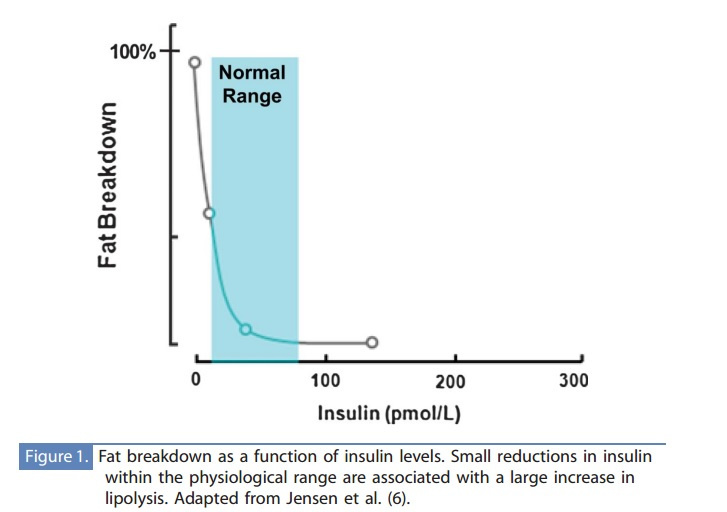That’s not how insulin works.
I can water fast for 5 days, draw blood to assay for insulin and be over 80 pmol/l (13.7 mIU/l to be precise). I’ve been ketogenic for 3 years (on the 20th of april) and lost 80 lbs, and become non diabetic - yet I still make plenty of insulin.
Look at where that puts my lipolysis. That is fairly typical for a type 2 diabetic, and most obese people share the same pattern whether they have actually been diagnosed with high glucose or not.
The question you have to ask yourself is how can an obese person with high insulin ever lose weight? If their insulin is high enough to stop fat cells releasing their payload even when they eat NOTHING.
The answer is that an obese person’s fat cells are no longer obeying the insulin message. What is holding them back from using stored energy is not insulin’s inhibition against lipolysis, but the fact that insulin ALSO blocks long chained fatty acids getting into their mitochondria to be burned.
When an obese person loses weight on keto it is because keto has dropped their insulin low enough to allow the use of fat for energy at the level of their mitochondria. When they stall it is because their fat cells are finally starting to obey the insulin message to inhibit lipolysis - so now they have a working system that can burn fat and store fat when insulin is high but they still make more insulin than a normal person.
A stall is actually a sign that you are becoming healthier, your fat cells are becoming un-deranged… Congrats.
The next step is to lower your production of insulin so that your fasting level is below 5 mIU/l (30 pmol/l) and then you will continue to lose weight, That requires time exposed to lower chronic levels of insulin.
For people who are not badly deranged that could take days or weeks, for some of us it takes years. Mine used to be 19.8 mIU/l, it’s now 13.7 mmol/l - I’m still above the rate that lipolysis is inhibited but the trend is my friend.
Strategies that can help;
- Pharma (Metformin and Berberine)
- Building Muscle
- Depleting that muscle of glycogen regularly
- Reducing dietary protein to maintenance levels
- Fixing your circadian cycle
- Reducing stress
- Give your body time at the new lower levels
In other words Keep calm and keto on
I can water fast for 10 days, then do a 100km bike race … still don’t see ketones above 3.5 mmol/l indicating I am still making enough insulin to inhibit ketone production even though I am clearing insulin at a prodigious rate.
Besides it’s not a matter of calories in vs Calories out. Unless you are running a marathon, no matter how much exercise you do, the amount of energy your body uses just sitting on the couch dwarfs it - and you don’t control that, that massive amount of calories out is directed by how much energy your body THINKS it has access to and if your INSULIN is high and your body fat is working then it doesn’t include body fat in that available energy calculus.
Stephen Phinney did an experiment once where he locked people in a met ward for 5 weeks, fed them a hypocaloric diet so they would lose weight and then had a randomized half of them run on a treadmill for 27 hours (up to 2 hours a day) while the rest just sat on the couch and watched TV.
http://www.metabolismjournal.com/article/0026-0495(88)90011-X/abstract
If you believe Calories in vs Calories out - you know the answer - the treadmill group lost more weight, Right?
Actually no the couch potatoes lost more weight (but not significantly more) - the reason is the runners burned LESS energy when they were not on the treadmill. By the end of the first week the runners had a 10% lower resting energy expenditure and it kept on dropping by a further 17%.
I have 9% body fat in my legs, 50% around my abdomen. I’d be interested to hear @davidvincent’s hypothesis of how the body could spot reduce body fat without the effect of insulin - that right there would be a billion dollar idea.
The reason some people lose weight by reducing calories and others don’t is determined by the amount of insulin they make. Evidently @davidvincent has low basal insulin. What works for him will not work for someone who has high basal insulin. But I expect that he is still convinced that all fat people need to just put down the metaphoric donut and get off the couch - and it will work for them just like it did for him.

